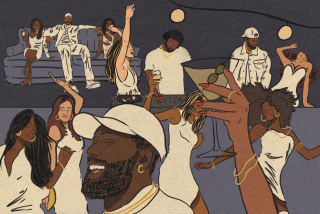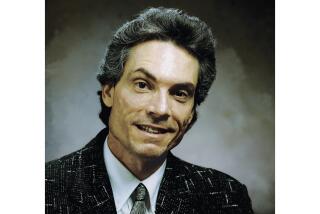Rappers Don’t Have Time for Newsweek’s Attitude
- Share via
Does rap have a bad attitude? Is it really appalling, repulsive, sullen, furtive, savage, anti-Semitic, obscene, nihilistic and “scary as sudden footsteps in the dark”--to quote some of the adjectives splattered across Newsweek’s March 19 cover story on rap music?
Over the past year, rap groups have made many headlines--N.W.A has been dogged by the FBI, Public Enemy blasted as anti-Semitic and 2 Live Crew accused of obscenity--as the mainstream media have begun to take a fresh look at the pop world’s most provocative new music. In a pair of stories written by Jerry Adler and David Gates, Newsweek’s seven-page spread takes a barbed, largely dim view of rock’s cutting-edge music, focusing almost exclusively on hip-hop and what Newsweek dubs the “The Culture of Attitude.”
“It is the culture of American males frozen in various stages of adolescence: their streetwise music, their ugly macho boasting and joking about anyone who hangs out on a different block--cops, other races, women and homosexuals,” writes Adler, who chided rap for celebrating gang culture, debasing women and glorifying attacks on police. His piece concludes: “It is not just that romance has gone out of music--attitude has done the seemingly impossible and taken sex out of teen-age culture, substituting brutal fantasies. . . . The end of attitude is nihilism. The culture of attitude is repulsive.”
The cover story’s negative tone prompted a flurry of heated protests from hip-hop heavyweights, record execs and writers covering the rap beat. Russell Simmons, chairman of Def-Jam Records, rap’s most successful label, fired off an angry letter to Newsweek, saying: “Surely the moral outrage in this piece would be better applied to contemporary American crises in health care, education, joblessness. . . . Blaming the victims--in this case America’s black working class and underclass--is never a very useful approach to problem-solving.”
Gates responded: “It was a long-term project. We first contemplated doing it as long ago as last summer. I’d be very surprised if anyone sat down and said, ‘OK. Let’s trash rap.’ That’s not the way we work around here.”
His colleague Adler added: “I really have no particular interest in rap. This was just an assignment. Our stories reflect many opinions other than the writers themselves.” A Newsweek staffer said it was “too early to tell” how many letters the magazine had received.
Other reactions:
Monica Lynch, president of Tommy Boy Records : “It was ridiculous. I didn’t see any media concern when rap was only big in the black community. White people can handle black comic expression, whether it’s from Eddie Murphy or Biz Markie. But when they get it straight, no chaser, from Public Enemy’s Chuck D, it’s a real threat.”
Ice-T, L.A.-based rap star : “It was totally biased. I can’t believe they got so worked up about sexism and bad language. A lot of blacks talk like they do in ‘Harlem Nights.’ They’re not all like the Huxtables--we don’t all have mothers who are lawyers. Kids get strong by seeing real portrayals of their lives. The story is really a reflection of white parents who are freaked out that their kids are all into rap. More than half my fans are white kids now. That’s what’s scary about rap to the people who’re in power--it breaks down barriers between the races.”
Nelson George, Village Voice columnist and author of “Death of Rhythm and Blues” : “This was bound to happen. Rap has become mainstream American rock--it’s like 1955 all over again. It’s typical that the only way for black people to be on the cover of Newsweek is if you’re Nelson Mandela or a crack dealer. I was quoted accurately in the story. I still have a lot of problems with N.W.A, who I think make black exploitation records. But this story, like other mainstream media pieces, was just totally out of touch.”
Steve Morse, pop critic for the Boston Globe : “The piece reeked of the same patronizing elitism that Esquire aimed at Bruce Springsteen a few years ago. It was a tabloid-style, right-wing commentary full of absurd generalizations and titillating nonsense that had no business in a supposedly serious newsweekly.”
Fab Five Freddy, host of “Yo MTV Raps” : “It was a little sensationalized, but I didn’t think it was so unfair. It’s not like it was written by Tipper Gore. Whenever you have something like rap, that’s so black, it’s gonna cause a commotion with white people. But you can’t take rap’s images so straight--it’s not violent. It’s pure theater.”
Bob Guccione Jr., publisher of Spin Magazine : “The tone of the story really offended me. It’s as if they were complaining about all these uppity ghetto people causing a fuss. I think they missed the essence of rap. It can be juvenile and ridiculous, but at its best it’s a very eloquent expression of anguish from people on the outside looking in.”
John Leland, music writer at Newsday : “The piece really missed what’s so exciting and rhythmically innovative about rap. A large part of the problem is racial. But we have a generation of parents raised on rock who think they understand music. And when rap comes along and they don’t get it, they think something must be wrong with it.”
Dave Marsh, editor of Rock and Roll Confidential : “For Newsweek, attitude is the same kind of code word as law and order. It was a nakedly racist story, with the inherent assumption that these are barbarians in our midst. It perpetuates the stereotype of rappers as dangerous black male youth. I didn’t see Newsweek do that when an equally dangerous cultural event like ‘Top Gun’ was the big movie of the year.”
More to Read
The biggest entertainment stories
Get our big stories about Hollywood, film, television, music, arts, culture and more right in your inbox as soon as they publish.
You may occasionally receive promotional content from the Los Angeles Times.









